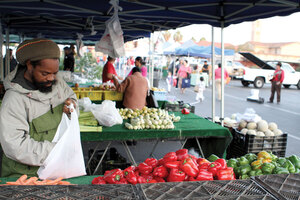Sales down, vendors point to economy
As the number of farmers’ markets on and around campus continues to rise, many of those markets — including the Trojan Fresh Market, which will be on campus on Thursday — have seen profits fall, though most blame the slip on the economy and not on the increased competition.
Besides the on-campus Trojan Fresh Market, there are at least six other markets near USC. Many of these markets report that their profits are down, but individual vendors often benefit by selling at multiple venues.

Farmville · A man shops for vegetables at the farmers’ market located at Adams Boulevard and Vermont Avenue. The market, which is near St. Agnes Catholic Church, runs on Wednesdays from 2-5 p.m. - Amaresh Sundaram Kuppuswamy | Daily Trojan
Helen Lee, who manages the farmers’ market at the Shrine that runs every Tuesday, said she does not think her market is competing with the Trojan Fresh Market or any of the others.
“We don’t consider us in competition with USC,” Lee said. “And the Trojan Fresh Market doesn’t affect our business. In fact, [USC] Hospitality came through here and took some vendors to the Trojan Fresh Market … We encourage that.”
Lee said she never had any intention of making money from the farmers’ markets. Instead, she wanted to help the vendors make money, so when they’re approached and asked to join other farmers’ markets, she views it as a good thing.
“[The Shrine farmers’ market] helps a lot of local neighbors who came here as vendors,” Lee said. “We’re definitely here just for the people.”
Vendors at the Shrine, however, have also found business to be slow so far this year.
Olove Boyd, an employee for Heavenly Delights, which sells cobbler at the Shrine and other farmers markets, said business is down right now.
“Usually it’s slow in the beginning, but hopefully it picks up,” Boyd said. “I think it’s the economy. Farmers’ markets are not a necessity … When there are cutbacks, people take hits.”
Boyd noted that it is USC that drives her business, even with the presence of the Trojan Fresh Market.
“The majority [of customers] are students and USC employees,” Boyd said. “USC helps our business or we wouldn’t be here.”
Dexter Scott, who sells beans at the Shrine farmers’ market, said he has also experienced a decrease in sales this semester.
“It is one half of last year’s gross income,” Scott said.
A farmers’ market on Vermont Avenue and Adams Boulevard seems to be experiencing the same problems as the Shrine farmers’ market. Most of the vendors are seeing less and less business, but still, they say the economy is at fault rather than competing markets.
“Each year it seems to get slower and slower because of the economy,” said Luis Buenrostro, who sells produce.
The market’s manager, Kimberly Edwards, said she also believes the decline in profits is because people do not have the money to shop at farmers’ markets. She said she does not think she is losing clients to other farmers’ markets in the area.
“A lot of these customers who come here … they follow us where we go,” Edwards said. “Our business is slow because of the recession, and farmers’ markets are more expensive than the store.”
Edwards added that USC drives the market, even though the Trojan Fresh Market is a more convenient option.
“We got a lot of people from USC coming here,” Edwards said. “We see doctors, students, teachers … We get a big variety of people from USC.”
But Meera Dahyabhai, marketing chair for the student group Environment First, which is involved in the Trojan Fresh Market, said she thinks the competition has affected Hospitality’s farmers’ market.
“The revenue patterns have overall decreased due to competition with other markets,” she said.
Still, she said she does not think the increasing number of markets is a bad thing.
“It’s all about reaching the same goal,” Dahyabhai said. “The main goal is to fund that idea of organic and fresh products to support local vendors.”

For a list of area farmers’ markets visit <a href=”http://www.universityparkfamily.com/> University Park Family.com.